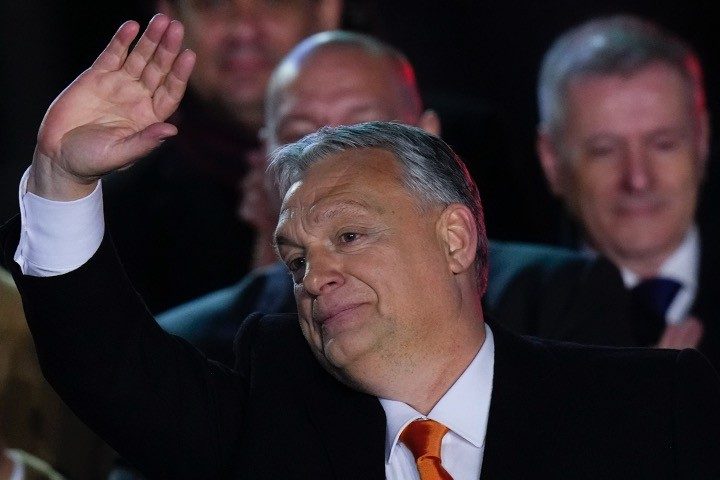
Hungarian Prime Minister Viktor Orbán’s Fidesz party cruised to victory in Sunday’s national election, marking a win for the country’s nationalist Right and delivering Orbán a fourth term at Hungary’s helm.
During a 10-minute election-night speech to Fidesz party officials and supporters in Budapest, the prime minister was received by chants of “Orbán” as he touted the party’s “huge victory.”
“We won a victory so big that you can see it from the moon, and you can certainly see it from Brussels,” said Orbán, who has frequently found himself the target of criticism by the European Union and the mainstream media.
Orbán’s coalition took home approximately 53 percent of the vote, while the opposing coalition, United for Hungary, won just 34 percent, per the country’s National Election Office.
The win was a decisive one, with opposition leader Peter Marki-Zay failing to win even in his own district, where he had served as mayor. This despite the fact that Hungary’s six main opposition parties put aside their ideological differences to form a United Front against Fidesz.
“The whole world has seen tonight in Budapest that Christian democratic politics, conservative civic politics and patriotic politics have won. We are telling Europe that this is not the past, this is the future,” Orbán said in his speech.
State secretary Zoltan Kovacs pointed to the participation of so many parties in the election as a testament to the strength of Hungary’s electoral system.
“We have heard a lot of nonsense recently about whether there is democracy in Hungary,” Kovacs said. “Hungarian democracy in the last 12 years has not weakened, but been strengthened.”
In a sign of the right’s successful performance Sunday night, the right-wing party Our Homeland Movement, labeled “radical” by the media, won over six percent of the vote — more than the five-percent threshold needed to gain seats in the 199-member parliament.
Orbán’s detractors say there are several factors that made defeating Fidesz difficult, including pro-government bias in the public media, the control of commercial news sources by Orbán’s allies, and an allegedly gerrymandered electoral map.
“Hungary seems to have reached a point of no return,” said Edit Zgut, a political scientist at the Polish Academy of Sciences in Warsaw. “The key lesson is that the playing field is tilted so much that it became almost impossible to replace Fidesz in elections.”
“We never thought this would be the result. We knew in advance that it would be an extremely unequal fight,” Marki-Zay said of the results. “We do not dispute that Fidesz won this election. That this election was democratic and free is, of course, something we continue to dispute.”
The opposition coalition ran in part on mending Hungary’s relationship with the European Union and NATO.
AP notes of the lead-up to the election:
While Orbán had earlier campaigned on divisive social and cultural issues, he dramatically shifted the tone of his campaign after Russia’s invasion of Ukraine in February, and has portrayed the election since then as a choice between peace and stability or war and chaos.
While the opposition called for Hungary to support its embattled neighbor and act in lockstep with its EU and NATO partners, Orbán, a longtime ally of Russian President Vladimir Putin, has insisted that Hungary remain neutral and maintain its close economic ties with Moscow, including continuing to import Russian gas and oil on favorable terms.
At his final campaign rally Friday, Orbán claimed that supplying Ukraine with weapons — something that Hungary, alone among Ukraine’s EU neighbors, has refused to do — would make the country a military target, and that sanctioning Russian energy imports would cripple Hungary’s own economy.
“This isn’t our war, we have to stay out of it,” Orbán said.
Ukrainian president Volodymyr Zelensky has depicted Orbán as an out-of-touch Putin supporter, while the Hungarian president pointed to Zelensky as part of the “overwhelming force” that his party had fought against.
Orbán’s reelection bid was endorsed by President Donald Trump. Orbán has taken heavy criticism from the Left for his social policies, which include laws prohibiting the promotion of homosexuality and transgenderism to minors.
Hungarians on Sunday also voted on a referendum on whether or not to ban sexually explicit media in sex-ed and sex-reassignment information targeting schoolchildren. Between 92 and 96 percent voted to end “the teaching of sexual orientation to underage children in public education institutions without parental consent.”
Also on Sunday, Serbia held its national elections. Serbian President Aleksandar Vucic and his populist right-wing party appeared to be on track to victory.




